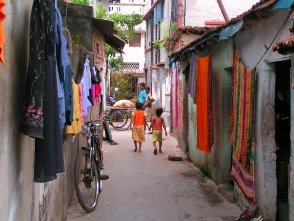It’s not often we think about what a blessing colour is. It really is everywhere, so it’s easy to take it for granted. And if I have given it more than a moments’ thought, I sound like I’m giving myself a Sunday School lesson “God made rainbows and pretty flowers.” Living in Dhaka and my short time in India has given me a whole new appreciation for the wonder of colour. Colour is flaunted here in free abandon. It is splashed across anything and everything and it is incredibly beautiful. My favourites are the clothes and the rickshaws. Rickshaws are elaborately hand painted with scenes of gardens, waterfalls or a handrawn portrait of a Bollywood actor. Yesterday I bought an anklet made of little coloured beads and tinkling multi-colour bells. I appreciated the little tag attached – “ The people and culture of Bangladesh are vibrant. Our journey is to keep that alive and to bring back the beauty of human touch to our lives... Let’s walk in harmony towards a colourful, beautiful Bangladesh”.
To wear jewellery here is to ‘adorn yourself’ with ‘ornaments’. I love that you can jingle from your wrists, ankles and/or ears and no-one bats an eyelid. If I see a woman outfitted in a sari, with all her jewellery on, I admire her like a 3 year old admires a bride and aspires to one day be a princess herself. Similarly, if I see a lady who has been working hard all day, her sari is old, faded, torn, yet to me it is stunning. It speaks of who she is and where she has been.
Imagine for a minute a world without colour. But not for too long or you might throw up. It’s monochromatic, horrible and immediately depressing. There is little room for expression and creativity. Being green with envy, feeling blue or being tickled pink is much more descriptive than being jealous, sad or happy. Imagine not having freedom to express your taste by choosing the colours you wear. It would be like wearing a uniform everyday of your life!
Of course there is potential for tension here. We are clearly warned against beauty coming from our outward adornments. And with outward beauty defined and worshipped by media and society we absolutely need to guard against placing value on people and ourselves according to perceived ‘beauty’. But to cherish and value the inner beauty that God adorns us with is not to dismiss colour and beauty and pleasing asthetic. After all, God did make rainbows and pretty flowers. Let’s remember that we are made in the image of our creator. Let us create!
Monday Maker - Baby Bubba Steps
8 years ago

